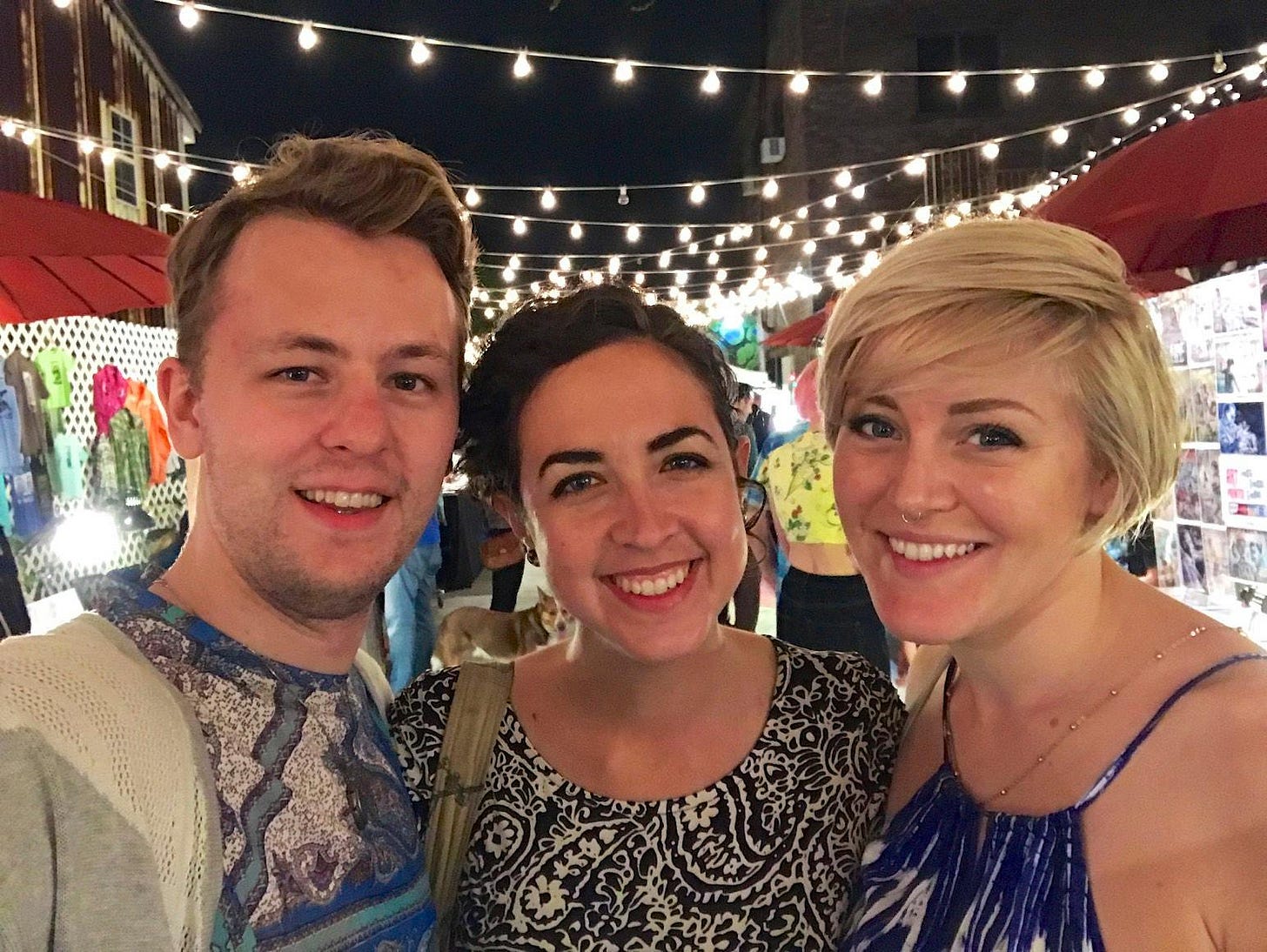As I approach 40, I’m embarking on a year-long project to reflect on the lessons I’ve learned in four decades of life. This is lesson #14. You can read the full series here.
Exactly one month and four days after my husband Jamie died, I traveled to New Orleans with two of my closest friends. We had planned the vacation, then as a foursome, to commemorate the day when we first met and became fast friends. We had grand plans to eat decadent meals, see boisterous bands, visit some of our favorite places, and drink and dance.
Three of us did all of those things. We also did things we hadn’t planned. We cried. We argued. We drank far more than we danced. We spread Jamie’s ashes. We held onto each other tightly, traumatized by the sudden loss of someone we so fiercely loved.
Despite it all, we had a wonderful, memorable time.
We did not plan for Jamie to die, but we had planned that vacation to New Orleans — and I’m grateful we stuck with those plans. I didn’t realize it at the time, but our choice taught me one of life’s greatest lessons: You can’t escape sorrow, but you can create joy.
Like many people who have gone through their share of hard times, I’m constantly waiting for the other shoe to drop, for something to go wrong. With the advent of each new week, a small voice inside me can’t help but wonder, Is this when it all falls apart?
(This is not a fun or effective way to live. I don’t recommend it.)
The Buddhist teacher Pema Chödrön would remind me that things will fall apart, whether I try to anticipate it or not. She would also tell me that things falling apart isn't bad, per se; it’s simply part of life.
“Things falling apart is a kind of testing and also a kind of healing,” Chödrön wrote in When Things Fall Apart: Heart Advice for Difficult Times. She continued:
We think that the point is to pass the test or to overcome the problem, but the truth is that things don’t really get solved. They come together and they fall apart. Then they come together again and fall apart again. It’s just like that. The healing comes from letting there be room for all of this to happen: room for grief, for relief, for misery, for joy.
Chödrön’s wisdom came to me when I needed it most. A year after Jamie’s death, I devoured her words, feeling like I finally found the guidebook I’d been looking for. I had spent the past 12 months grieving and miserable. Looking ahead, I wanted to make room for the flip side: the relief and the joy.
Our trip to New Orleans was an early experiment in finding joy, but it also felt like an obligation — a way to keep a promise we’d made before everything in our lives shattered. I also knew that taking trips, literally escaping the sadness, wasn’t a sustainable way to find joy. I wanted to find more of the small, everyday moments of happiness — the surprises, the laughs that bubble up when you’re fully expecting to sob.
Joy is time with friends. It’s a child’s high-pitched giggle. It can be found in the pages of a book during a quiet, lazy morning or in the bass of a song during a loud, fun night. Joy is the joke that breaks the terrible tension of a funeral service. It is the warmth of sunshine on your skin. Joy is simple. Joy is small. It reminds you why life is worth living.
It’s something I needed more of. Something I needed to heal.
The writer
has a lot of experience with life falling apart. Just a few days ago, she wrote that a recent bone marrow biopsy revealed a trace amount of leukemia. That means she has to resume chemotherapy, a grueling experience she’s undergone many times before. That also means Jaouad is leaning on a practice she’s found comfort in many times before: noticing and cultivating moments of joy.Jaouad first wrote about small joys a couple years ago as she was recovering from her second bone marrow transplant. “For the last few months, small joys have been my sustenance,” she wrote.
Often these small moments fade from view with the passage of time. What makes it into our memory banks are the bigger things — either the zeniths or the nadirs — but what we end up longing for and leaning on in hard times are the little quotidian comforts and delights; they lift and carry us from day to day. Noting these joys is a muscle I’ve been consciously trying to exercise: training the eye to see them and training the mind to hold onto them.
Jaouad explained that there’s a difference between celebrating small joys and opting into a culture of “toxic positivity.” Noting the joys isn’t about being grateful no matter what or searching for the silver linings in every situation. It’s about taking time to notice the lightness, even if everything else is dark.
“I love observing tiny daily joys because it feels natural and easy, not forced, not pressurized, not all or nothing,” she continued. “And not only has the practice helped ease this difficult passage, it’s helped me identify what lifts me up, and then I can cultivate more of it.”
Next year marks eight years since Jamie died. In that time, I’ve gotten plenty of practice creating joy and experimenting with different ways to note those moments. I’ve kept a gratitude journal. Billy and I have shared something good that happened each day. I’ve spent less time fearing triggers and more time looking for glimmers.
In early 2022, when many people were starting to venture back into the world, but people like me were still waiting for Covid vaccines for the tiny humans we cared for, I began a practice of listing three small joys at the end of each day. I was feeling stuck, frustrated, and resentful — but past experience had taught me that observing small joys would help me out of my rut.
“Much like gratitude journaling, this practice is meant to redirect my brain from negative thinking,” I wrote. “It’s an attempt to remind myself that, despite the lack of theaters, airports, and other exciting places I used to visit, my days are still filled with plenty of joyful moments. It’s also a way to reassure my grief-mind that experiencing joy doesn’t mean that everything will soon come crashing down.”
I continued:
The joys I’m experiencing lately are relatively small. I’ve traded rowdy nights out with friends for sweet tickle sessions with my toddler. Instead of singing along with a massive concert crowd, I’m dancing alone in my living room. I’ve swapped fancy restaurant meals for good-enough home cooking.
As a result, my joy journal is a collection of teeny, tiny moments.
In that journal, I noted the rainbows dancing on my bedroom walls, the daffodils that brightened my neighborhood walks, and the warm cup of coffee brought to me in bed. I savored the sight of Billy and our daughter coloring together in our living room, the conversation with a dear friend spent reminiscing about old times, and the wonderful feeling of completing a project before its deadline. These were simple moments. They were small. And they were, as I wrote back then, “evidence of a life well-lived.”
The pandemic was a big reminder that things fall apart — albeit a collective, strange one. Things will continue to fall apart for all of us in less bizarre but no less devastating ways, too. We will get fired, divorced, or sick. We will run into trouble with money, love, or friends. We will lose the people we can’t imagine living without. We will lose so much.
Amid all that loss, we’ll gain wisdom and perspective. We’ll understand that we can’t control what sorrows will come our way or when they’ll happen. We’ll learn to count on the small joys, even in the most difficult moments. We’ll trust that if we stay open to them, those joys will come. And if we take note of them, they will grow. We will smile. We will laugh. We will, somehow, learn to live again.
xoxo KHG








Beautiful. I make a practice every week of writing down little moments of happiness in my phone, and compiling the list on Facebook on Fridays. And I absolutely agree that it's not about being relentlessly positive - I also share when things are sad, and frustrating, because what's the point if I'm not bringing my whole self? But even hard weeks have those glimmers of beauty.
Wonderfully written and an important reminder that it is all “just life” — the joy and sorrow. Clearly you’ve done magnificent work in bringing joy to your life in the midst of great sorrow.